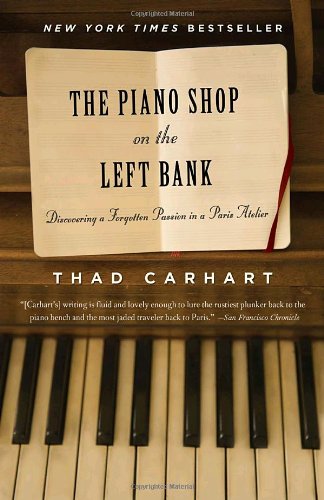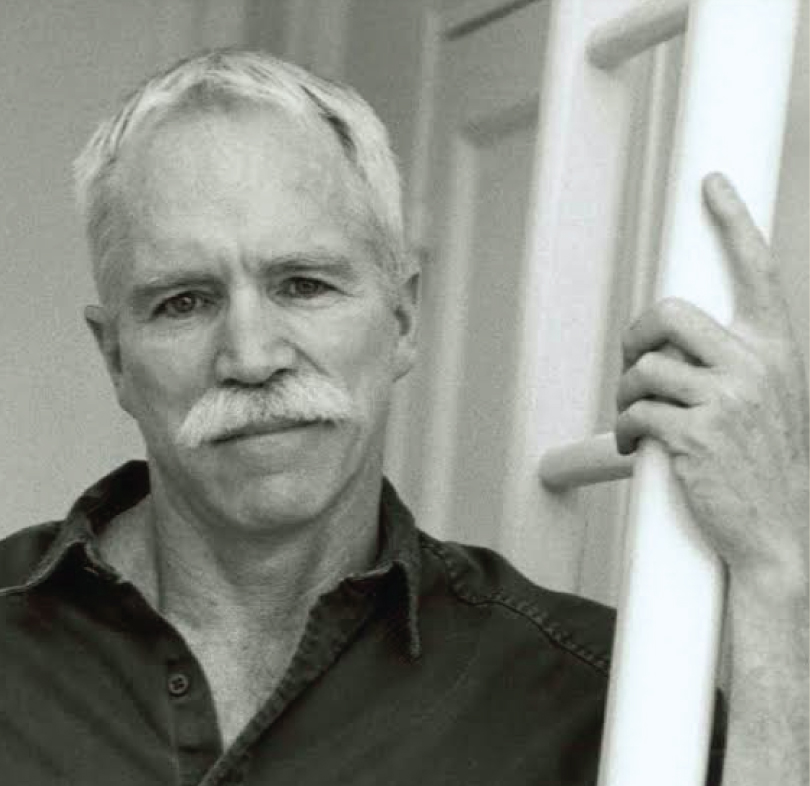—
The Piano Shop
on the Left Bank
Discovering a Forgotten Passion
in a Paris Atelier
RANDOM HOUSE
ISBN: 978-0375758621
SHARE
NOW IN ITS
21st
edition
New York
Times
Bestseller
Walking his two young children to school every morning, Thad Carhart passes an unassuming little storefront in his Paris neighborhood. Intrigued by its simple sign—Desforges Pianos—he enters, only to have his way barred by the shop’s imperious owner. Unable to stifle his curiosity, he finally lands the proper introduction, and a world previously hidden is brought into view. Luc, the atelier’s master, proves an indispensable guide to the history and art of the piano.
Intertwined with the story of a musical friendship are reflections on how pianos work, their glorious history, and stories of the people who care for them, from amateur pianists to the craftsmen who make the mechanism sing. The Piano Shop on the Left Bank is at once a beguiling portrait of a Paris not found on any map and a tender account of the awakening of a lost childhood passion.
Named one of
the best books
of the year by
The Washington
Post Book World
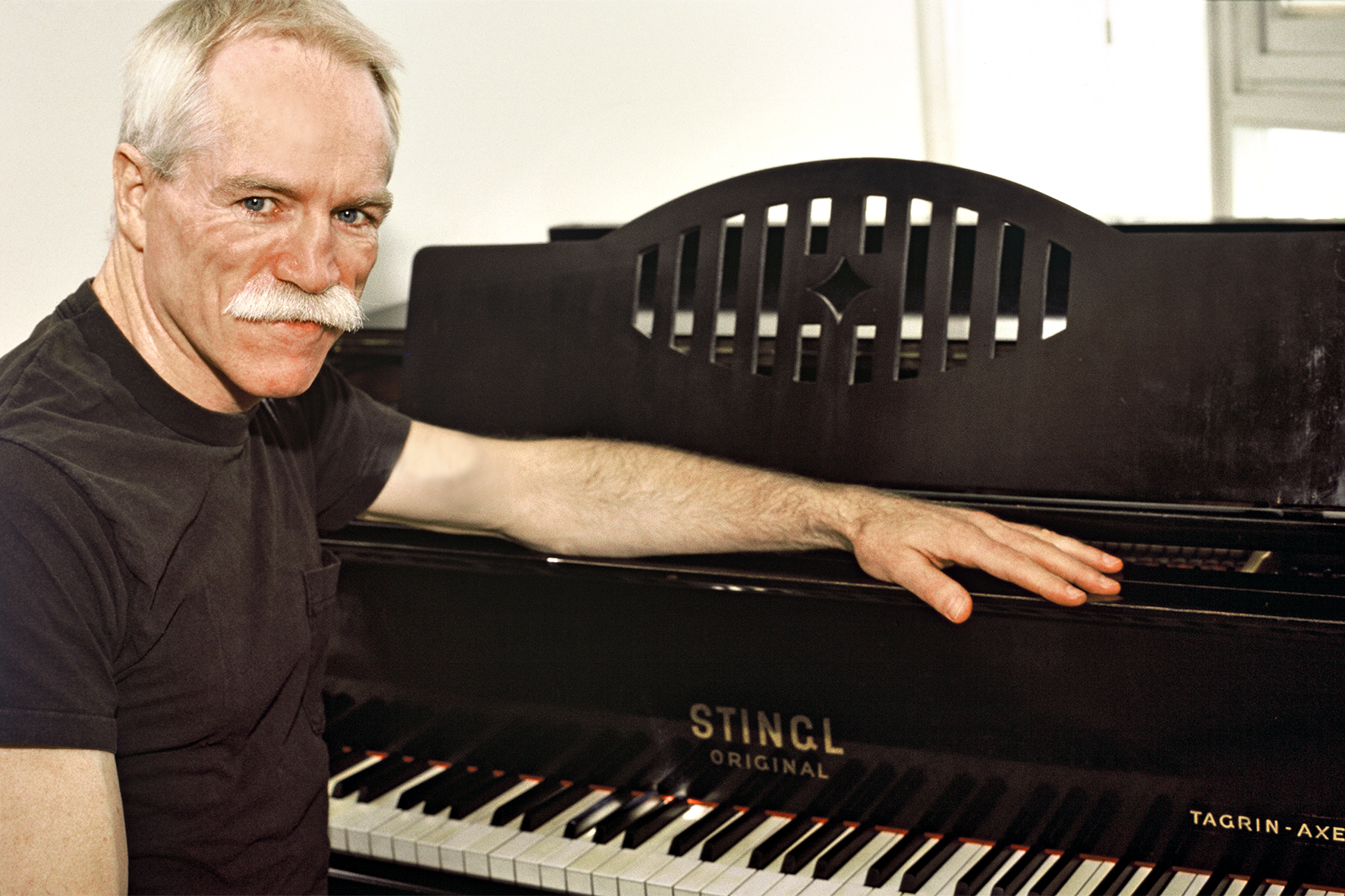
The Stingl
“Captivating… [Carhart] joins the tiny company of foreigners who have written of the French as verbs…. What he tries to capture is not the sight of them, but what they see.”—The New York Times
“In this quirky and tender book about the rediscovery of Carhart’s childhood passion for music lies a deeper meditation on the voluntary dreams of acceptance by his chosen city.”
—Rose Tremain
“Thoroughly engaging… In part a book about that most unpredictable and pleasurable of human experiences, serendipity…. The book is also about something more difficult to pin down, friendship and community.”
—The Washington Post
“Carhart writes with a sensuousness enhanced by patience and grounded by the humble acquisition of new insight into music, his childhood, and his relationship to the city of Paris.”
—The New Yorker
“A love affair with the piano… A minor classic.”
—Times Literary Supplement (London)
“[Carhart’s] writing is fluid and lovely enough to lure the rustiest plunker back to the piano bench and the most jaded traveler back to Paris.”
—San Francisco Chronicle
“A captivating book, as desultory as an evening stroll, yet full of knowledge. It is suffused with Parisian sensations, the smell of fresh bread from the local bakery, water washing down the gutter in the morning…. You can read it in an evening, but when you close it you feel you have been on holiday.”
—Sunday Times (London)
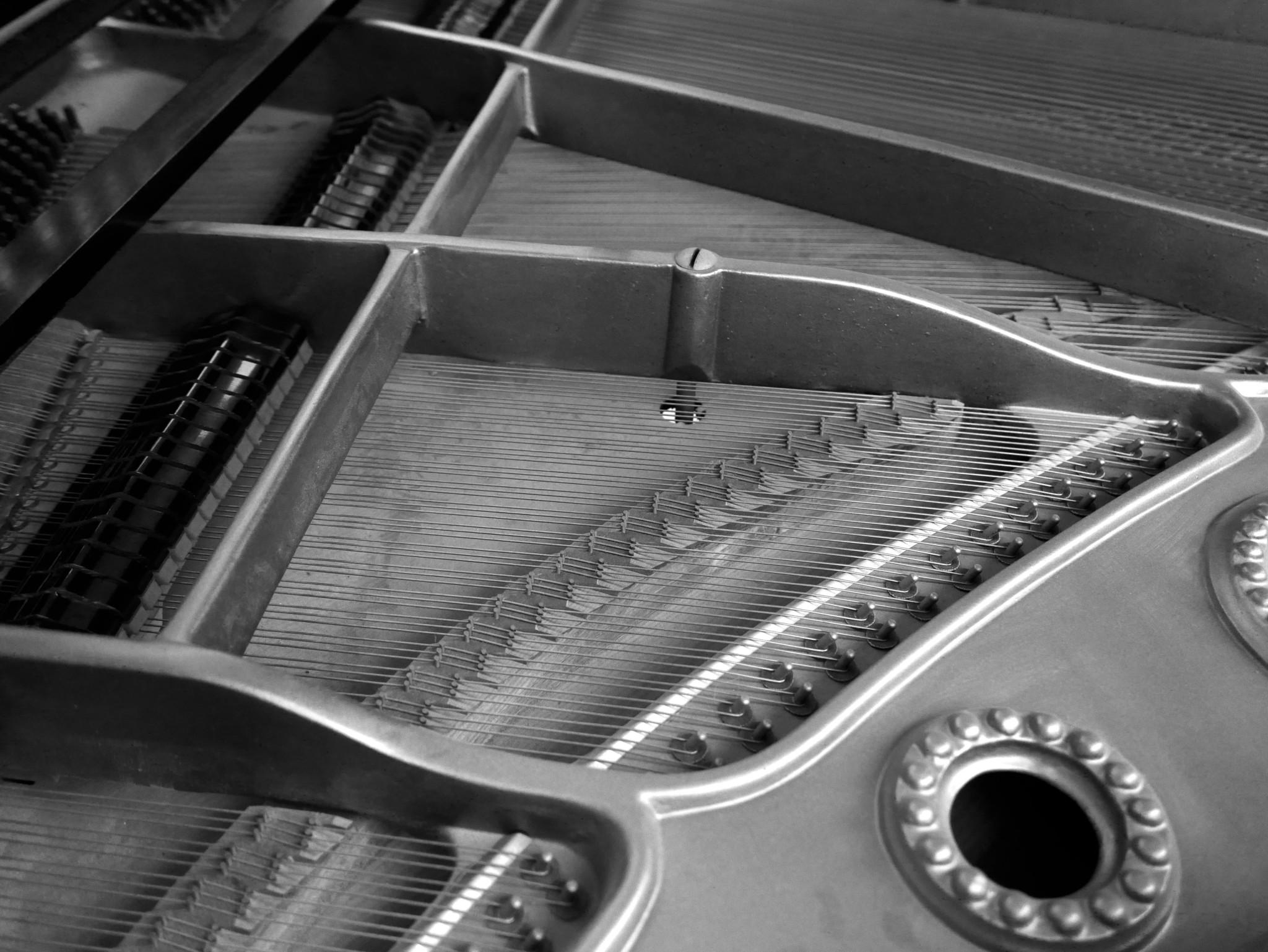
Craftmanship
Q&A
A talk with Thad Carhart about
The Piano Shop on the Left Bank
How did the idea for this book come about?
I’ve lived in Paris since 1989 where I initially took a job in corporate communications before focusing full-time on writing and freelance journalism. Some years ago I happened upon a little shop in our Paris neighborhood where used pianos are repaired and sold. It was a funny little storefront that I passed by every morning as I walked my children to school, and I always wondered what was behind the sleepy facade.
What made you want to go in?
The front window had a strange array of piano repair tools, and curiosity finally got the better of me and I decided to knock on the door and see for myself what was inside. I met the owner, Luc, and he eventually let me into the back room where pianos were disassembled, fixed, and stored, I’ve always loved pianos—both as musical instruments and as huge pieces of furniture—and roaming around the shop was like being a kid in a candy shop. It gave me the idea that I could take piano lessons again as an adult after being away from the keyboard for more than twenty years.
Why write a book about this?
I’d lived in France for long enough to know that it’s almost impossible to gain access to the private, non-touristy side of things without a personal introduction, and here was a whole world I virtually stumbled into. From the very beginning I realized it would make a great story if I could capture the ambience of friendship, enthusiasm, and French humor that I had serendipitously been made part of.
Why are we so drawn to Paris?
It’s a fascinating question. Part of the answer is that Paris does a terrific job of selling itself to the world. It’s beautiful, yes, but so are plenty of other cities, and yet Paris alone stands above the rest as the capital of romance, the center of style and sophistication, the pinnacle of culinary arts, the international crossroads for artists, musicians, diplomats, writers, and endless tourists. There’s a lot of substance behind this seductive image of Paris, but it’s only part of the picture. After all, if you live in Paris you don’t really spend much of your time on the Champs-Elysées or visiting the Louvre. They’re an important part of the landscape, but life goes on elsewhere. And this “elsewhere” is really the hidden part of Paris, an aspect every bit as seductive as the tourist haunts but much harder to break into. Behind all those huge doors and inner courtyards and high walls there’s a Paris that’s infinitely attractive, a city of tightly knit neighborhoods and long-term relationships that is rich in the ways of the past without being the least bit old-fashioned. That’s one of the main things I try to evoke about the piano atelier without being too analytical about it: it’s part of a way of life that could only be found in Paris.
How hard is it to gain access to this other Paris?
You’re either invited in or you’re not, and it generally takes time for familiarity and trust to build up with the French. If you live in the neighborhood and do business with local merchants, send your children to local schools, go to the street markets and fairs with your neighbors, then you already have contacts who can, literally and figuratively, open doors. That said, I still think there’s a great advantage to getting off the beaten path in Paris even if you’re only there for a short stay. Despite their reputation, Parisians can be very welcoming to outsiders if you meet them halfway. Having the language helps immensely, of course, as does a genuine interest in the French way of doing things. If you’re interested in bookbinding or lamp shades or model trains or any number of things, you can be sure that Paris will have small specialty stores where, as often as not, the owner will be glad to tell you about a specifically French approach to the subject. And you may just stumble upon some of the neighborhood life that usually goes on behind closed doors.
Why are we so drawn to pianos?
Well, there’s nothing that even approaches the range of invention that is possible at the keyboard. Melody, harmony, even counter-harmony: all can be played by a single person at the keyboard at the same time. It’s an amazing instance of manual dexterity translated into musical complexity and sophistication. From Mozart to Thelonious Monk, the piano is the composer’s instrument of reference. And, of course, no other musical instrument is also a huge piece of furniture that we live with, day in and day out, our photos and flowers propped on top as if it were a kind of domestic shrine. No wonder that people become attached to their pianos.
So you think that pianos occupy a special place in peoples lives?
Certainly they do for many of us. Musically, they’re unique. But they’re also just too big to ignore. I’ve been amazed at the number of readers who have shared personal stories with me about their pianos: selling a valuable instrument to stake a new departure in life; carrying a grand piano out into the front yard as the house went up in flames; hiding the family silver in the closed cabinet. Pianos are truly amazing receptacles of memory and emotion for many families. And of course there are some funny, almost surreal stories. My favorite is of the concert pianist who was performing in a large theater with a raked stage. The stagehand who positioned the instrument had unfortunately forgotten to block the piano’s wheels. When the pianist began the first piece, the piano—a nine-foot concert grand weighing three quarters of a ton—started to roll downstage. As the audience and the soloist watched, aghast, it gained momentum, flew off the edge of the stage, and crashed into the empty orchestra pit where it broke in half. Concert canceled!
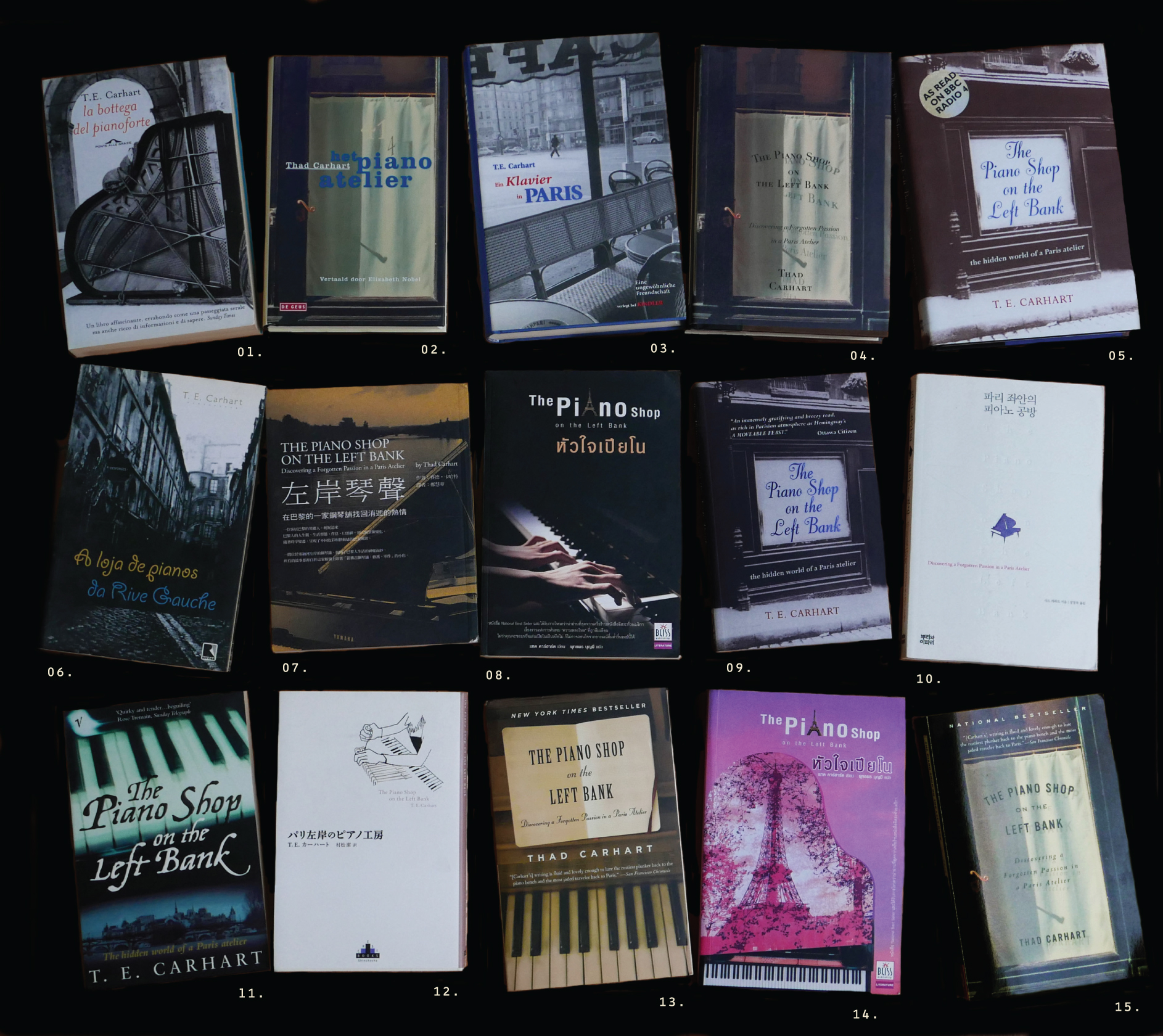
15 covers from international editions
From left to right
top to bottom
- Italy, Ponte alle Grazie
- Netherlands, De Geus
- Germany, Kindler
- US, Random House
Trade paperback - UK, Chatto & Windus
hard cover - Brazil, Record
- China, Cité
- Thailand, Bliss 1st
- Canada, McArthur and Co.
- Korea, Puriwa
- UK, Vintage paperback
- Japan, Shinchosha
- US, Random House
paperback - Thailand, Bliss 2nd
- US Random House,
hardcover
